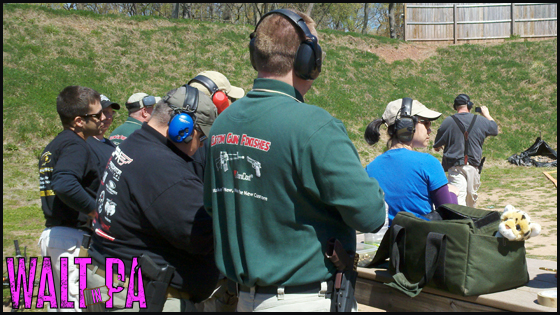
With April upon us, Pennsylvania USPSA season is in full swing and I absolutely love it. The weather on Saturday (April 7, 2012) was perfect for shooting and I was eager to hop in my car and make the drive to shoot USPSA at Lower Providence.
Still being fairly new to the sport, my experience is limited to about four gun clubs. I’ve found that after you’ve shot each clubs a handful of times, you will see trends begin to develop. For instance, at some clubs you’ll see stages that are primarily run and guns, with targets anywhere from ten yards in to bad breath distance. At at another club you may find targets spread out to a maximum distance of forty yards.
When it comes to USPSA at Lower Providence, you get the best of both worlds. On many stages you may find yourself throttling your shooting pace up and down because you have a good mix of close range targets and shots that require a little finesse out at twenty to twenty five yards. This club also uses a lot of angles where you find yourself leaning around props to get a clean shot.
If we were to play te word association game with this club, I suppose that would say finesse when I think of Lower Providence Rod and Gun Club. As a result, this club has become one of my favorites to shoot USPSA.
Stage 3: Hedorah’s Assault Course
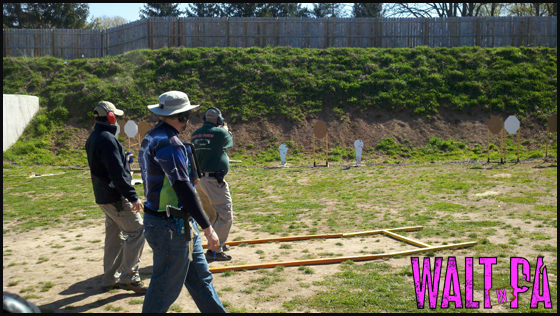
After the shooters were broken up in to squads, I found myself reading the written stage briefing for Stage 3. This was an IPSC Classifier stage setup in such a way that three targets would be engaged from within a shooting box forty-eight feet away. The center target in this array was crowded with penalty targets on either side, making for a tight shot on the A Zone. The shooter would then move into another shooting box and engage two steel poppers and another IPSC Classic target. Last, the shooter would move to a final shooting box and engage three more targets from a distance of thirty-three feet.
My plan was to start off my taking my time and getting well placed shots on the first array. I didn’t want to risk punching a hole in a penalty target and was happy to trade speed for accuracy. I would then reload while moving to the second shooting box so that I would have a fresh magazine to start with. I wanted to take full advantage of the wide shooting box and try to take the steel poppers and paper target on the move. I would then reload on my way to the last shooting box and pick up the pace to end the stage strong.
After the Buzzer
At the buzzer I drew my gun and fired two rounds, at the left most target, as quickly as I felt comfortable at sixteen yards. I transitioned to the middle target and slowed down, getting a clear sight picture, before squeezing off two rounds. Once I was clear of the penalty targets surrounding middle target in the array, I picked up the pace once again.
I reloaded as I moved to the second shooting box and had my gun up and ready to fire as soon as my foot landed inside the box. I fired the first round as my trailing foot left the ground and pulled my first two shot high and to the right. The steel went down on the third shot and I began baby-stepping my way across the box. The second piece of steel went down on the first shot and I fired two quick rounds at the paper target before leaving the shooting box.
I reloaded while moving to the final shooting box. This time I wasn’t ready to fire immediately and wasted a little time getting set to make my last shots. Once set, I engaged targets from left to right at a speed that felt comfortable for ten-yards.
Scoring
Despite taking what felt like an eternity engaging steel on the move, I did rather well on this classifier stage. I ranked 6th out of 29 shooters in Production Division and was the highest ranking C Class Shooter. I managed 14 A’s and 2 C’s bringing in 76 out of a possible 80 points, in 18.98 seconds.
Taking a closer look at my scores, I basically shot 95% of the available stage points with a Hit Factor of 4.0042. I’ve been reading as of late that shooters should strive for 90% of the available points on the stage. Lower than 90% and you are moving too fast, higher and you aren’t moving fast enough.
Stage 4: Rodan’s on the War Path
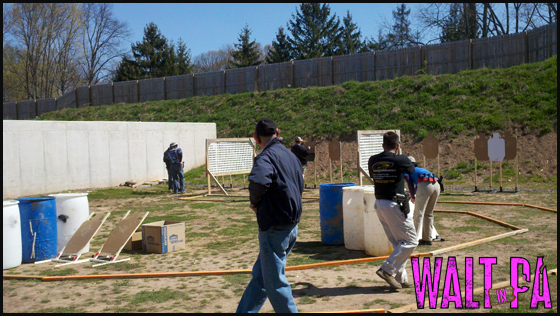
Stage 4 was essentially a large semi-circle and was situated in such a way that you could engage all targets from the top half of the circle, at farther distance, or make your way around the semi-circle and take your shots from a much closer distance. My initial thought was that I wasn’t worried about the distance and would take all of my shots from the top half of the course.
Because our squad arrived on this stage before the squad ahead of us was finished, I payed attention to how others were addressing the stage. Everyone with optics, shooting open division, was taking the approach that I planned to use while everyone shooting iron sights were running through the course to take their shots at closer range. I wasn’t sure that this approach was best for me, shooting Production division, but kept an open mind.
I went through my dry run planning on turning ninety degrees and engaging the targets from a distance but changed my mind at the last minute. I thought that I could run the course and hose the targets at close range faster than I could get well placed shots from a distance. The last thing that went through my mind before hearing “Shooter Ready, Stand By” was “Okay, turn one hundred and eighty degrees and book it around the circle. Whatever you do, don’t fall!”
After the Buzzer
When the buzzer sounded, I turned and started running. As I approached the top portion of the bend, I turned left and engaged two low targets quickly. As I shifted back to the right to continue down the arc, my foot got caught on the fault line and I lost my balance. I stumbled, kept my gun pointed down range, and flapped my left arm like it would somehow keep me on my feet. I managed to stay on my feet and get my bearing when I heard someone watching call out “WHOA!”
I was a little rattled with my near face-plant but stuck to my plan. As I rounded the bend, two more low targets appeared behind a barrel. I fired two rounds at the first and slowed to a crawl to avoid hitting a penalty target that covered everything but the head of the last target.
I went wide on the bend and engaged a target at the back of the range. I reloaded while I moved towards the next array and got my rhythm back. I fumbled the reload but engaged the three target array on the move. I reloaded, much cleaner this time, and engaged a second array of three targets, on the move. I performed one last realod and engaged a final array of three targets while leaning around a wall.
Scoring
While this stage was a lot of fun to shoot, and I did fairly well, re-watching the video stresses me out. I see a variety of things that if corrected could have shaved off enough time to get me damn close to the Top 3.
After my trip, I stopped dead in my tracks to engage a head-shot target at close range. I think I must have been spooked by the penalty target that was front and center and took too much care to not hit it. From there, I was pretty happy with my reloads but engaged each array of three targets, backwards. I should have taken them from left to right so that there was less of a pause between when I was ready to shoot and when the right most target appeared from behind the barricade.
All in all, I can’t complaint too much. I ranked 7th out of 29 shooters in my division. I pulled down 25 A’s, 2 B’s, and 1 C, with 134 of a possible 140 points. My time was 25.66 seconds with a hit factor of 5.2221. Like the previous stage, I scored 95% of the available stage points, so theoretically I had room to speed up.
Stage 5: Rebirth of Mothra
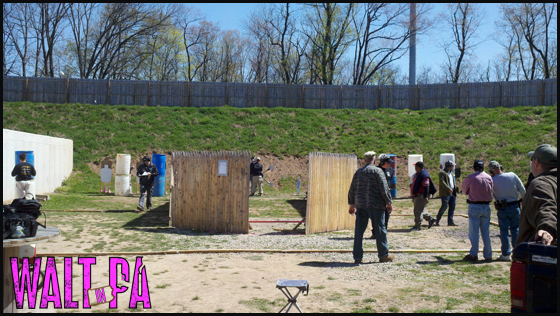
Stage 5 was probably the most interesting stage of the day, in terms of watching game plans. Essentially, the stage could be broken down into three parts. The first of those portions was directly in front of the shooter as the stage began. From an opening in a fence, the shooter was presented with a Texas Star, two Pepper Poppers and two IPSC Metric targets (the paper could be seen from elsewhere on the course).
On the left, down the fence line, a variety of IPSC Metric targets were tucked behind stacked barrels. One target could only be seen from the far left corner of the course, making losing track of targets not very difficult.
On the right, down the fence line, a variety of IPSC Metric targets were tucked behind stacked barrels. Unlike the portion on the left, this side was more spread out and required much more movement to set up a good shot.
On the surface this doesn’t sound like a stage that would instill fear into the hearts of shooters, but it did. One of my shooting buddies got himself all worked up over the Texas Star and planned out what he would do when, not if but, when he made too many missed shots. Other shooters saved the Texas star for last as they expected to run out of ammo and wanted to make sure they shot all of the paper.
My plan was to engage that Texas Star first as it was the first thing I saw when the buzzer went off. While I didn’t waste too many shots on this moving target, the course as a whole taught me a lesson in dealing with compounded problems.
After the Buzzer
When the buzzer sounded, I stepped forward and loaded my Glock 17. I pressed my gun out and made the first mistake of the stage. Instead of shooting the Texas Star properly, attacking the head and arms first, I shot out what would be the left leg. The star became unbalanced and began whirling about at a high rate of speed. I completed the Texas Star in nine shots, which felt like it took forever (It wasn’t bad by comparison, there were several shooters that took much longer).
After a reload, I took two shots to down the pepper popper on the right and one round to down the popper on the left. With the center portion of the stage cleared, I began to work my way to the left. I ran to the far left corner of the shooting area and engaged two targets tucked behind some barrels. I then moved around a barrel and skipped a target, engaging the two on the right. Knowing something was wrong with my round count, I began to move about frantically, trying to find the target that I was missing, while I performed a reload. After a string of profanity, I stopped and put two rounds on what I thought was the missed target.
I retreated up the fence line and around to the right portion of the stage. Just after rounding the corner I engaged targets, near to far, that were tucked back behind a series of three barrels. I moved down the fence line, performed a reload, and engaged a target situated at the back of the pit. In a momentary lapse of judgement, I brought the gun in and almost performed a very unnecessary reload. I caught myself and pressed back out to engage another target tucked behind a barrel. I moved to the right corner and closed out the stage with a pair of targets tucked behind a pair of barels.
Scoring
As I walked this course with the Range Officer and Scorekeeper, I was feeling pretty good. The scores being called out were solid hits and my time wasn’t horrible, all things considered. When we got to the left side of the range to score targets, I couldn’t help but shake my head and laugh.
“You put those two rounds on the wrong target, this one has four A’s and you’ve got nothing on this one.” Fortunately, the Range Officer felt that it was hard to say that I failed to engage the missed target (I was looking for it, after all) and shouldn’t take a Failure to Engage Penalty.
In the end I came away with 25 A’s, 4 C’s, and 2 M’s (Misses with a -10 Point Penalty per miss) with score of 117 (penalties incorporated), out of a possible 155, points and a time of 63.61 seconds. I ranked 14th out of 29 shooters on this stage and had a hit factor of 1.8393. The interesting thing here is that had I put those two desperate A Zone Hits on the right target, string of curses and wasted time still included, I would have been in the Top 10.
Stage 1: Up and Back
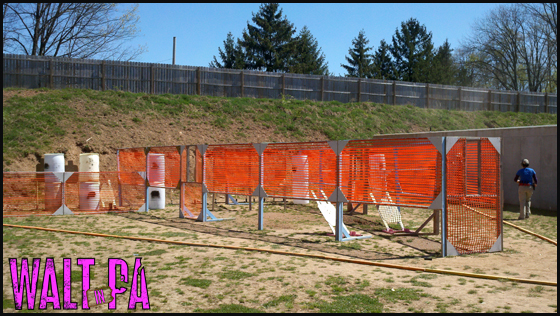
I don’t want to come off sounding like a hot-shot shooter or anything, but when it comes to shooting local USPSA matches, I don’t get nervous. Two stages into my very first match I lost the ‘new shooter jitters’ and just enjoyed ‘doing my thing’. That isn’t to say that I don’t get uncomfortable.
The only time that I feel rushed and uncomfortable is when I’m the first shooter on a given stage. I think this comes down to the walk-through and how I get agitated standing behind a shooter who seems to be taking forever to do their dry run. I’m sure that in most cases it is a figment of my imagination. I know that when we get started, I’m the first person that needs to shoot and I want to develop a plan and run through the stage a few times before that happens.
When the stage is cleared and the Load and Make Ready command is given, the rushed feeling goes away and I’m ready to do my thing. In the case of Stage 1, I wasn’t completely comfortable with my stage plan and had my doubts. When I encountered a hiccup in my plan, I was struggling with another case of compounded problems.
After the Buzzer
When the buzzer sounded I took two steps forward while drawing my gun. I made sure to press out and begin shooting while well outside the port. My thought process was that since I could easily see all targets from that position, it would save me time to shoot from there rather than getting in, then back out of, the port.
I engaged four targets with two rounds each. Oriented like a square, I first shot the rear right, followed by the front right, followed by the front left, then finally the rear left. In my mind, this wasn’t ideal way to shoot the array, but I had a momentary lapse in my stage plan.
I pulled the gun in and performed a reload while I moved down the left wall. Like the first port, I stopped short and began engaging from a distance. I had three targets visible and intended to put two rounds on each. I felt like I pulled a shot and fired a third on one target before moving further down the wall.
As I moved to the next array of targets, I reloaded my Glock 17 once again. Moving right to left, around a series of barrels, I engaged one target with three rounds (another makeup shot), the second with two rounds, and the third with two rounds.
The makeup shot on the first target threw me off course and I did not reload while I ran back up-range to get around to the opposite side of the course. I stopped short of the port once again and put two rounds on the far left target, two rounds on the middle target, and my gun went to slide lock. I had to perform a standing reload before engaging the last target in the array. I made my way to the end of the course and engaged four more targets, situated around barrels, with two rounds each, to close out the stage.
Scoring
When the dust settled, I began to walk the stage with the Range Officer and Scorekeeper. I wasn’t too upset to hear that I shot 27 A’s and 5 C’s on the stage, earning me 150 out of a possible 160 points. I knew that speed would become a factor due to my makeup shots and standing reload. Even so, I shot the stage in 40.98 seconds with a 3.6603 Hit Factor.
I came in 11th place in my division and I can’t complain. The fact that I stayed out of ports and pulled down 94% of the possible stage points put a smile on my face. As far as I’m concerned, that was impressive for being the first shooter on the stage.
Stage 2:
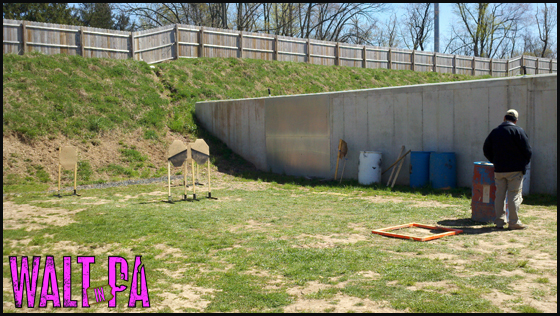
Stage 2 was our squad’s last stage of the day. The stage itself wasn’t difficult, the challenge was to resist the urge to follow your instincts, and instead, do what was written in the stage description.
The first string explained that upon the buzzer, the shooter was to engage each IPSC Classic target with a single round, reload and engage each target with one more round. String two was much the same as the first, however, all shots fired after the reloaded needed to be made strong-hand only. String three was one shot on each target, weak-hand only.
Typically, a shooter fires two rounds in succession on each target. Following that practice here would draw penalty points and your score on the stage would sink like a stone.
After the Buzzer
For as simple as this stage looks, it took a great deal of concentration. If for one second I allowed autopilot to take over, I would tank the stage. I took my sweet ol’ time and performed a quick dry run before the start. When the buzzer sounded, I focused and put rounds on target in the specified order.
As the Rango Officer relayed my first string time to the Scorekeeper, I took the time to perform another dry run. I mimicked the single shot on each target, imitated a reload, pulled my weak hand away, and envisioned putting one more round on each target. The second string went as planned but I engaged the strong-hand only targets backwards (I went left to right instead of riding the recoil from right to left).
While the time was relayed again, I did a dry run weak hand only. Like I learned from Julie Golob’s Shooting USA Pro Tip, I imagined getting a low grip on the gun, pulling it from the holster, and passing it to my weak hand. From there I would engage targets from left to right, to ride the recoil from target to target. The third string went off without a hitch and I was finished.
Scoring
I knew, without a shadow of a doubt, that my time was going to be slow. I was happy to sacrifice speed for focus and accuracy. As it turns out, I did just that with 19 A’s and 1 C, earning me 98 out of a possible 100 points (98% of the available points).
While my accuracy rocked, my time came in at 27.17 seconds, which put me at a 3.6069 Hit Factor. I took 11th place on that stage, and to be honest, I’m happy with that.
Match Results
When the match results were posted, I was ecstatic. Ever since my rough start to the season at York IWLA, in March, I have taken a more mentally comfortable approach to shooting. I’m trying not to dwell on previos stage performance and am doing my best to approach each stage with a clear head. It seems to be working for me as this was my best match of the season. Not only was I happy with an 8th place finish, for the first time I won my class (Top C Class Shooter in Production Division).
- Division: Production
- Shooters in Division: 29
- My Place Within Division: 8th
- Totals Hits: 110 A’s | 2 B’s | 13 C’s | 0 D’s | 2 M’s | 0 NS’s
- Total Points Earned: 575
- Available Points: 635
- My Available Point Percentage: 92%
- Average Hit Factor: 3.6666
Recent Posts
The Price of Rushing: A Winter Riding Story & Four Years of YouTube Friendship
You know those moments when you do something that isn't exactly catastrophically stupid, but just stupid enough to make you shake your head at yourself? Yeah, we've all been there, and today I'm...
Finding Joy in Unexpected Places: A Memorable Motorcycle Ride to Remember
As we roll into 2025, I've been reflecting on the rides that made 2024 special. While the year didn't provide as many opportunities to hit the road as I'd hoped, one particular adventure stands out...
